- Home
- Peter Carey
Oscar and Lucinda bw-1988 Page 51
Oscar and Lucinda bw-1988 Read online
Page 51
105 Miriam
Miriam Chadwick was not in mourning and had, once again, thrown away her widow's weeds although Mrs Trevis, her smudge-lipped employer, had thought, out loud, that this was tempting fate.
"Who have 7 to mourn for any more?" said Miriam Chadwick who was, when this conversation took place, holding Mrs Trevis's newborn babe, a bad-tempered little chap, always "sucky" and given to banging his little head against the governess's shoulder.
"You might mourn for me, or Mr Trevis," suggested Mrs Trevis.
"Oh, there is no likelihood of that," said Miriam Chadwick tossing her hair back off her shoulders-beautiful hair, coal-black hair, raven hair, but who was there to see its dark blue lights out here at Marx Hill? "No likelihood at all," said Miriam, bouncing the babe resentfully, and leaving her comment ambiguous as long as she dare, "with both you and Mr Trevis in such fine health."
413
Oscar and Lucinda
"Here/' said Mrs Trevis, reaching out for the babe while she gently cuffed her little boy who was reaching for a saucepan on the kitchen table. "Here, 111 take bubba. You try your hand at t'other."
"T'other" was the butter churn which wooden wheel of torture Mrs Trevis now abandoned to her governess.
"If you have nabbed young Reverend Hasset," Mrs Trevis began, an observation that had nothing to do with mourning or widow's weeds, but was intended to bring her uppity governess (she thought herself too good to set the fires or scrub the milk pails) to a proper understanding of her place in this society.
"I did not attempt, as you put it, to 'nab' the poor man, although there is no doubting he was properly 'nabbed' without him knowing what had happened."
"Jealousy killed the cat/' said Mrs Trevis, dipping her finger in the butter jar and then slipping it into her infant's sucky mouth.
Miriam Chadwick looked on with her handsome nose wrinkled.
"Curiosity."
"Beg yours?"
"It was curiosity that killed the cat."
"Curiosity in the beginning," said Mrs Trevis, "but jealousy in the end. It is bad luck to throw away your widow's weeds."
This conversation was in Miriam Chadwick's mind on the hot Thursday afternoon when, with the Trevises all gone into Boat Harbour to buy provisions for the Easter feast, she was savouring her solitude, sitting on the wooden step, looking down at the curve of the Bellinger River. She was running through her list of unsatisfactory or irritating or boorish suitors when she saw a church made from glass towed into her field of vision by two men in wide straw hats. Her first thought was disappointment that Mrs Trevis was not here to witness this thing with her, that she must exclaim to nothing but the empty air. "Oh, my," she said, feeling that some subtle victory had been somehow denied her, "just look at what you have missed. Just look. Just look at it."
It came up the river, its walls like ice emanating light, as fine and elegant as civilization itself.
"Who?" demanded Miriam Chadwick. "Who? Just answer me that." Who in this valley of muddy boots could be responsible for such a thing? For it was not simply that the little steep-roofed church was made from glass, but that it had all the lovely proportions and gracenotes of a fancy constructed for a prince, say, in Bavaria.
All along its roof ridge there was a decorative edging, a frill-she
Miriam
could not make it out exactly but it would seem, there, to be like a line of fleurs-de-lis. The glass sheets of its walls were not square and dull like window panes, but tall and thin, with a triangulation at the top, and a lovely cast-iron frieze made of medallions (crests?), which repeated in a frieze along the bottom of the walls. This cast-iron frieze must be nearly three feet high-ornate like the rood screen in a cathedral.
She did not see or appreciate Mr Flood's speciality-the cast-iron barley-sugar scrolls of which he had been so proud-and indeed it would not be more than a minute before she forgot the miraculous building entirely-it soon assumed no more importance than a pretty wrapping paper for, as the lighters slewed in the river, the glass regained its transparency, and she saw the blacksuited figure sitting on a chair inside the church. At this moment her sense of wonder was completely swamped by more practical concerns, for if this lovely building was a church — and was that not a cross at the termination of the cresting?then the blacksuited man inside was almost certainly a clergyman. She had an aqua moire-silk riding habit, which was thought "unsuitable" in Boat Harbour. She put it on. She had a little hat with a veil. She fastened it with a long pin. There was no time for bathing. She went out into the home paddock and caught the bad-tempered little Shetland which had been left at home, smacked it hard across the nose when it tried to bite her. The beast pulled its head back and its eye, though wild, was less wild than usual. "So," thought Miriam Chadwick,
"you are a bully like the rest of them." The pony pulled. Miriam hit it again, refllecting bitterly on the brutalizing effects of life at Fernmount.
The pony would not go slow. It went at speed, cantering, almost galloping down the rutted shaleloose hill towards the river. She lost her pretty little whip at the gate but the pony was hardmouthed and would not pull up. She came on to the cattle path beside the Bellinger. She came beside the rowing men and the glass church on the barge.
"Oh, dear God," she prayed, "do not let me appear as such a fool." She cried with fright as the pony stumbled on a crumbling piece of riverbank, regained its footing, and continued, leaving the church behind, in the direction of the landing wharf at Boat Harbour. She thought it obvious to everyone what she was up to and was, in consequence, ashamed. At Boat Harbour she had to hide an hour or two and not be seen by her employers or their children, who were, it seemed, at every
Oscar and Lucinda
draper's shop and corner. She sat in the prayer room above the cobbler's shop and having begun by pretending to pray, ended by doing it in earnest.
9
106
The Aisle of a Cathedral
The Bellinger was not like it is now, with wide electric-green fields pushing down on to the river. The banks were like green cliffs of camouflage pierced with giant knitting needles and spun and tangled all about with ferns and creepers. It was a landscape already bleeding from the stabbing and hacking of the cedar cutters, but the wounds were all internal, in the belly of the bush, and although Oscar saw how Percy Smith and his two helpers must jump and poke with their punting poles to keep them clear of floating cedar logs, he did not guess the history of these logs. He saw only the shrieking walls of jungle which threw up wide-winged birds as the church approached.
Laudanum or no, he was not at ease. He called for Percy Smith to lock the door. He placed his hard wooden chair in the very middle of the church. He prayed out loud and his voice had a hard vibrant quality inside the glass. He said: "Oh Lord, I am alive in the midst of Thy dreadful river. All Thy glory surrounds me, but I am afraid."
Outside the walls, he could hear the man named "rumgo" giggling. This had no more importance to him than the cries of savage birds.
My great-grandfather drifted up the Bellinger River like a blind man up the central aisle of Notre Dame. He saw nothing. The country was thick with sacred stories more ancient than the ones he carried in his sweat-slippery leather Bible. He did not even imagine their presence. 41A
The Aisle of a Cathedral
Some of these stories were as small as the transparent anthropods that lived in the puddles beneath the river casuarinas. These stories were like fleas, thrip, so tiny that they might inhabit a place (inside the ears of the seeds of grass) he would later walk across without even seeing. In this landscape every rock had a name, and most names had spirits, ghosts, meanings. He had given his hat to Kumbaingiri Billy's father's sister. It was the Wednesday before Good Friday, and although it was now cool in Sydney, it was hot at this latitude. Under the canopy of glass it was very hot indeed. Only on the dog-leg bend at Fernmount was the riverbank able to provide any shade.
Kumbaingiri Billy saw the glass
church. He was a young boy, initiated only the year before. He was with the men, hunting, at the place which is now named Marx Hill. He saw the glass church in the distance-a prism, a cube, a steeple of light sliding into the green shadows of Fernmount. There were men with blue shirts and wide-brimmed hats. They held long poles. They stood around the perimeter. In the middle was a man. Even in the shadow, so Kumbaingiri Billy told my father, hre danced around this man's head.
Oscar could not see the blacks watching him. He was not frightened of the blacks. He was frightened of other things. The wooden platform beneath his feet was built on H. M. McCracken's two lighters, which remained, in spite of all the nails and planks and lashing that joined them together, two independent entities. Thus when one lighter bobbed it would not be in step with its companion and the result of this was that the foundation of the fragile bird-cage church would shift and twist. Glass, for all its great strength under compression, cannot easily tolerate this sort of twisting.
Three panes of glass had cracked. These panes were in the roof. They crazed and hung like iceknives. Their jigsaw edges refracted the colours of the rainbow across my great-grandfather's clasped hands. He was gaunt and ugly, with a bright Adam's apple and a bright red hooked nose. He looked like the most fearsome Calvinist. There were white unburnt rings around his eyes. His green irises were set in yellow whites and these were laced with fine red rivers. Percy Smith drove his pole into the mud. Vectors of force fought with each other for a resolution. The platform beneath Oscar's feet twisted. Another pane splintered and, this time,
Oscar and Lucinda
fell at the foot of the barley-sugar columns in the little chancel. "Oh, Lord," he prayed, as sweat ran down his brow and into his eyes, "I thank Thee for granting me this day." For answer, three more panes crazed. And while, according to all the laws of science, they should have fallen-there was no wire reinforcing in the glass, nothing but its own splintered edges to hold it there-it stayed in place. It was a blemish on the sky, like something curdledmilky-white, like crinkled cellophane. The man inside the church waved his hands, gestures which appeared, from the perspective of Marx Hill, to be mysterious, even magical, but which, inside the crystal furnace of the church, had the simple function of repelling the large and frightening insects which had become imprisoned there.
There were bush-flies inside the church. They did not understand what glass was. There were also three blue-bellied dragon-flies. For one hundred thousand years their progenitors had inhabited that valley without once encountering glass. Suddenly the air was hard where it should be soft. Likewise the tawny hard-shelled water beetle and the hang-legged wasp. They flew against the glass in panic. They had the wrong intelligence to grasp the nature of glass. They bashed against "nothing" as if they were created only to demonstrate to Oscar Hopkins the limitations of his own understanding, his ignorance of God, and that the walls of hell itself might be made of something like this, unimaginable, contradictory, impossible. While the three men worked around him with their long sapling punting poles, Oscar put his hands over his ears or waved them in the air. The fractured glass cast a burning spectrum across his forehead. He said: "Oh, God, I praise Thee. I praise Thy dreadful river. I am not afraid." But his hand sat on the hard lump in his pocket where the sticky laudanum bottle sat. He thought: It will soon be over.
But the church burnt his already burnt skin and he watched the exquisite jewel-blue dragon-flies crash against the glass. He felt a stab of panic, that he had made his bet on secondrate information. It was not God who had persuaded him, but that "other voice." He took his jacket off and put it over his head and shoulders, and that is how, when the fractured church was finally towed to the jetty at Boat Harbour, the government inspector mistook him, in the evening light, for a hooded nun.
41 «
•. 107:;-!: " •
Arrival of Anglican Church at Boat Harbour
The Reverend Dennis Hasset had discovered a leech in his sock. He was trying to walk home to his house so he might remove it. Actually, it was not merely one leech, it was two, although both of them were anchored at almost the one spot with the result that one had grown fat and bloated while the other stayed lean. The sight of this shining black slug with two tails turned his stomach and he would have run, were it not for the likelihood that, being seen to be in flight from something, he would be set upon by drunken bullock drivers or be pelted with potatoes by the snotty-nosed children of the Magneys or the Walls.
When he heard about the glass church his only thought was that he would not now be able to deal with the leech at home. He certainly did not make the connection with Lucinda. In fact he did not strictly believe what he heard. He knew only that there was a structure which his informant, the clerk from the government offices, imagined was a church and which would, eventually, prove to be a steam saw or a lifeboat or a smashed-up phaeton recovered from a shipwreck at The Heads.
To remove the leech, he needed salt. He could buy a ha'penny-worth at Hammond and Wheatley, which he did, favouring one foot a little, resisting the urge to rub ankle against ankle while he waited behind Mrs Trevis who was, between buying flour and bacon, relating the story of her Grandfather Dawson's service as a coach painter to Her Majesty the Queen. The clerk from the government offices ran in twice to fetch him and it was he who begged Mr Hammond please to serve the reverend gentleman because he was required by the government inspector to be at the landing wharf "quick and lively."
The Reverend Dennis Hasset got his salt. He was not accustomed to shopping. He was surprised at how much salt you got for a
419
Oscar and Lucinda
ha'penny. There was no way you could slip this into your pocket. It was a hefty bag and must be held under the arm. He did so, marching down Hyde Street while the government clerk, a huge fellow with hefty hands and a cowed spirit that made him bend forward and bow his neck, clucked and fussed and postulated this and that about this strange glass church. The Reverend Mr Hasset was plotting a way to get the salt in contact with the leeches. He was therefore disappointed to see that a crowd had gathered at the wharf. This would make the operation that much more difficult.
He listened to the clerk as they pressed through to the river. As usual, most of the crowd were drunk. They smelt loathsome: unwashed clothing, rum, vomit. Hell itself could smell no worse than this. Dennis Hasset opened his bag of salt and took a fistful.
It was then that he saw the church. He thought so many things at once. That it was a miracle, a spider web, a broken thing, a tragedy, a dream like something constructed for George in and then assaulted in a fit of rage. He thought: It has been hit with hail. He thought: it has been salvaged from a wreck out at The Heads. He thought: it was a mistake to triangulate those tall panes of glass when a Roman arch would be much more graceful. He thought: Lucinda. It was the latter thought that made the mole on his back turn hot and itchy because he had never, in all his letters, bothered to tell her that he was now a married man and soon to be the father of a child.
In the face of this crazed image of Lucinda's passion, he was numb with panic. His mole was driving him crazy with its itching. He held his salt. He stood with the most of his weight on the foot that did not have the leeches. He waited for Lucinda to emerge from between the barleysugar columns. He could not see through the glass itself-it had become, with all the splintering, almost opaque. He tucked the bag of salt under his arm and fixed a smile on his face, but as H. M. McCracken's leaky old lighters were moored to the bollards on the wharf, the figure that emerged from the church's wooden door was not that of Lucinda Leplastrier, but a gaunt collarless burnt-ghost figure who marched towards him carrying a little suitcase like a hat-box.
"Sir," said Oscar and held out his hand.
Dennis Hasset's hand, alas, was filled with salt. He opened it, by way of explanation. The burnt man stared at it and laughed; it was not a normal laugh but a dry noise like a cough.
"The Reverend Mr Hasset?"
!
Ain
Arrival of Anglican Church at Boat Harb°ur
There was something very dangerous about this staring man. His green-eyed gaze was too intense. He would not rel<*se his hold on Dennis Hasset's eyes, not even for a second.
"Yes," said Dennis Hasset.
"Then I have the pleasure, sir, to present this splen<*id church to you. It is a gift to the Christians of Boat Harbour fr" m th «most wonderful woman in New South Wales." The ghost seemed oblivious to the splintered state of the church. "I tell you now, without reserve," he roared, "I envy you. This woman loves you.'
Dennis Hasset felt ill. He wished to withdraw. All the godless of Boat Harbour pressed their thick necks and cauliflowerears forward. He stooped and poured his fistful of salt into his sow- The madman was now crying. His face was as di^X and tattered as the bandages around his wrists.
"How you can stand there," Oscar said, "when U& ^plastrier pines in Sydney, why, it is quite beyond my comprehen
The salt in Dennis Hasset's sock was as painful as ground glass. He thought: When, oh Lord, will my past follies stop returning to torment me?
He put his hand on the shoulder of the weeping man-He intended Christian charity, but felt only an alien body as W* and bony as a suit of armour. It was then, wondering how he could stop the germs of scandal which were already multiplying around him, that he saw Miriam Chadwick's bright green riding costume

 True History of the Kelly Gang
True History of the Kelly Gang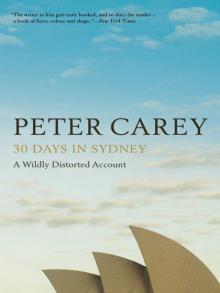 30 Days in Sydney: A Wildly Distorted Account
30 Days in Sydney: A Wildly Distorted Account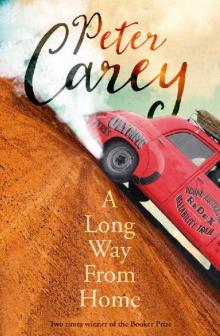 A Long Way From Home
A Long Way From Home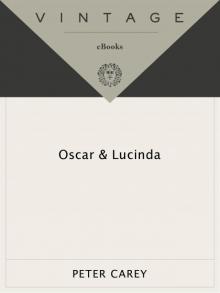 Oscar and Lucinda
Oscar and Lucinda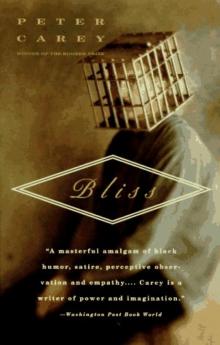 Bliss
Bliss Wrong About Japan
Wrong About Japan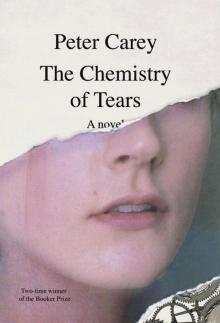 The Chemistry of Tears
The Chemistry of Tears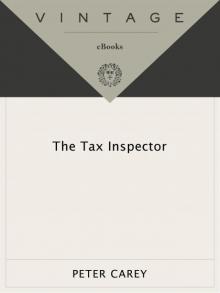 The Tax Inspector
The Tax Inspector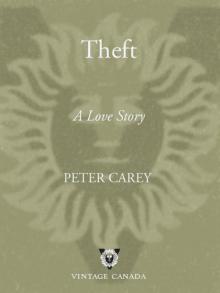 Theft: A Love Story
Theft: A Love Story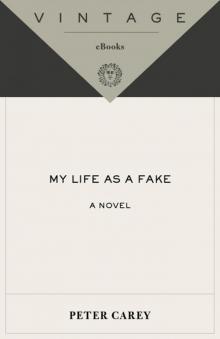 My Life as a Fake
My Life as a Fake Collected Stories
Collected Stories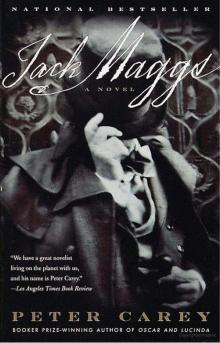 Jack Maggs
Jack Maggs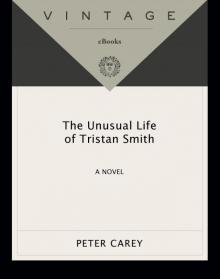 The Unusual Life of Tristan Smith
The Unusual Life of Tristan Smith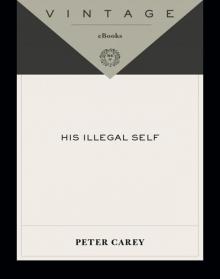 His Illegal Self His Illegal Self His Illegal Self
His Illegal Self His Illegal Self His Illegal Self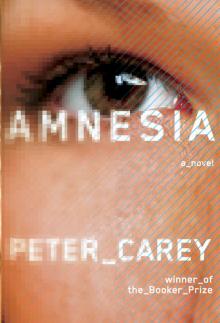 Amnesia: A Novel
Amnesia: A Novel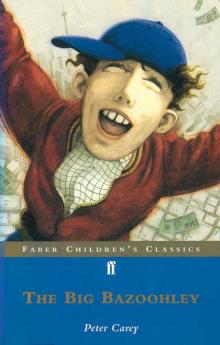 The Big Bazoohley
The Big Bazoohley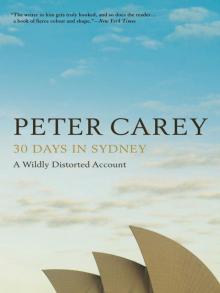 30 Days in Sydney
30 Days in Sydney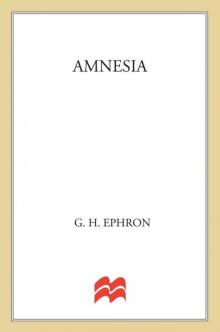 Amnesia
Amnesia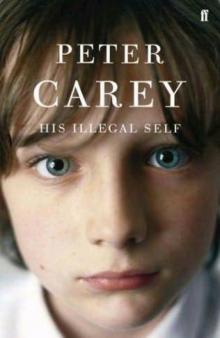 His Illegal Self
His Illegal Self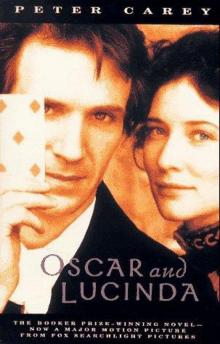 Oscar and Lucinda bw-1988
Oscar and Lucinda bw-1988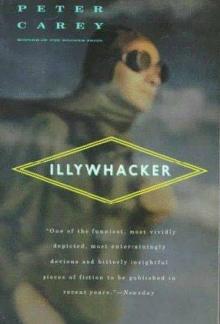 Illywhacker
Illywhacker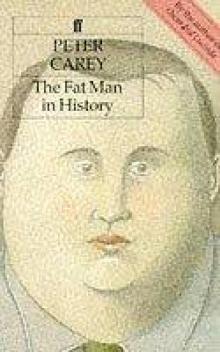 The Fat Man in History aka Exotic Pleasures
The Fat Man in History aka Exotic Pleasures